
Five Speaking Tips for Medical Conference Presenters
Public speaking for medical professionals can be daunting. But adequate preparation and a clear vision of what you want to share will help ensure success.
Medical conference attendees have high expectations of presenters, and so they should. After all, attendees invest time, money, and effort to attend professional development events. In return, they deserve to be addressed by speakers who are prepared, articulate, and stage-savvy.
Not everyone is comfortable speaking in front of an audience, though, especially when the audience is a group of their peers. Even people who understand every nuance of their topic have been known to become speechless when they walk on stage and face a room full of colleagues, which is why preparation is so vital.
If you've been invited to speak at a conference, you need to formulate a plan that will empower you to own the platform, engage the audience, and confidently share your expertise. Here are five ways to help you accomplish those goals:
1. Know your audience.
Ask the event organizer in advance who will be in attendance, what kind of venue you'll be speaking at, and how many people to expect. Then, ascertain whether you'll be presenting a keynote on the main stage or a breakout session in a small room. Let the meeting planner know if you require a specific room set-up or if you need a table, chair, or any other items on stage. These critical details are the foundation of tailoring your presentation for the audience.
2. Think in threes.
Whether you're going to be speaking for an hour or a day, you'll stand a better chance of remembering what you're there to share by pre-organizing your presentation to include three core points. Once those main points are established, break things down even further by adding three sub-points to each of the primary ideas. This process allows you to focus on remembering a short list of topics rather than feeling like you have to memorize every word of an entire speech. If you need notes to refer to, write the three main points and three sub-points in large letters on a single piece of paper, and place it in your field of vision.
3. Consider your optics.
If slides are part of your presentation, be mindful about the quality and quantity of the images you project. Graphs and other data can easily get lost on the screen, especially in a large room. When sharing a statistic, you'll make a powerful impact by putting just a figure on the slide, like 85 percent or 7/10, for example. Then, use your voice to fill in the details. To keep people visually stimulated, alternate a slide that has a photograph or illustration with a slide containing a few words or numbers in a large font. Audiences generally dislike it when a speaker turns to the screen and recites every word. To really succeed, don't read! Not every point needs a slide, by the way; consider using a variety of props and actions to bring your knowledge to life.
4. Expect technical challenges.
No matter how many times you check the equipment, there's a good chance you'll experience some kind of technical glitch. Know your presentation well enough that you can share it despite electronic or human error. If you plan to use your own computer rather than one provided, make sure to bring compatible cables. Even if you've forwarded you visual presentation to the meeting host, bring a copy on a memory stick and e-mail it to yourself and upload it to a virtual space where you can access it online. Always ask to do a sound and technical check, including testing the slide advancer, before the presentation. And ladies, if you're going to be using a headset or lapel microphone, wear a skirt or pants so the battery pack can be clipped to your waistband. If you wear a dress, be sure it has a belt.
5. End on time.
Successful conferences require meticulous timing. Your audience, host, and meeting planner will all love you for concluding your presentation at or a few minutes before your allotted time. If you have to start late or get ahead of yourself, always be prepared to amend your talk to fit the time you have. Bring your own clock, and place it where you can discreetly glance at the time. If you use your phone or tablet as a timing device, make sure to silence the notification alerts.
Speaking at a conference can enhance your credibility and broaden your network. Are you prepared to take the stage?
Sue Jacques is The Civility CEO®, a veteran forensic medical investigator turned corporate civility consultant, professional speaker, and author. Sue helps individuals and businesses gain confidence, earn respect, create courteous corporate cultures, and prosper through professionalism.
Newsletter
Optimize your practice with the Physicians Practice newsletter, offering management pearls, leadership tips, and business strategies tailored for practice administrators and physicians of any specialty.






